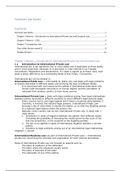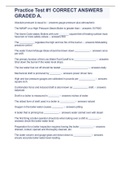Resume
Summary International Awareness Law IBO Y3
- Cours
- Établissement
- Book
Summary of all contents needed for the law part of the International Business Awareness Book. Chapters 1, 5, 7 of A Basic guide to international business law, by H. Wevers. Class slides are also added and some pages of the book Introduction to business law, by L. Jones
[Montrer plus]













